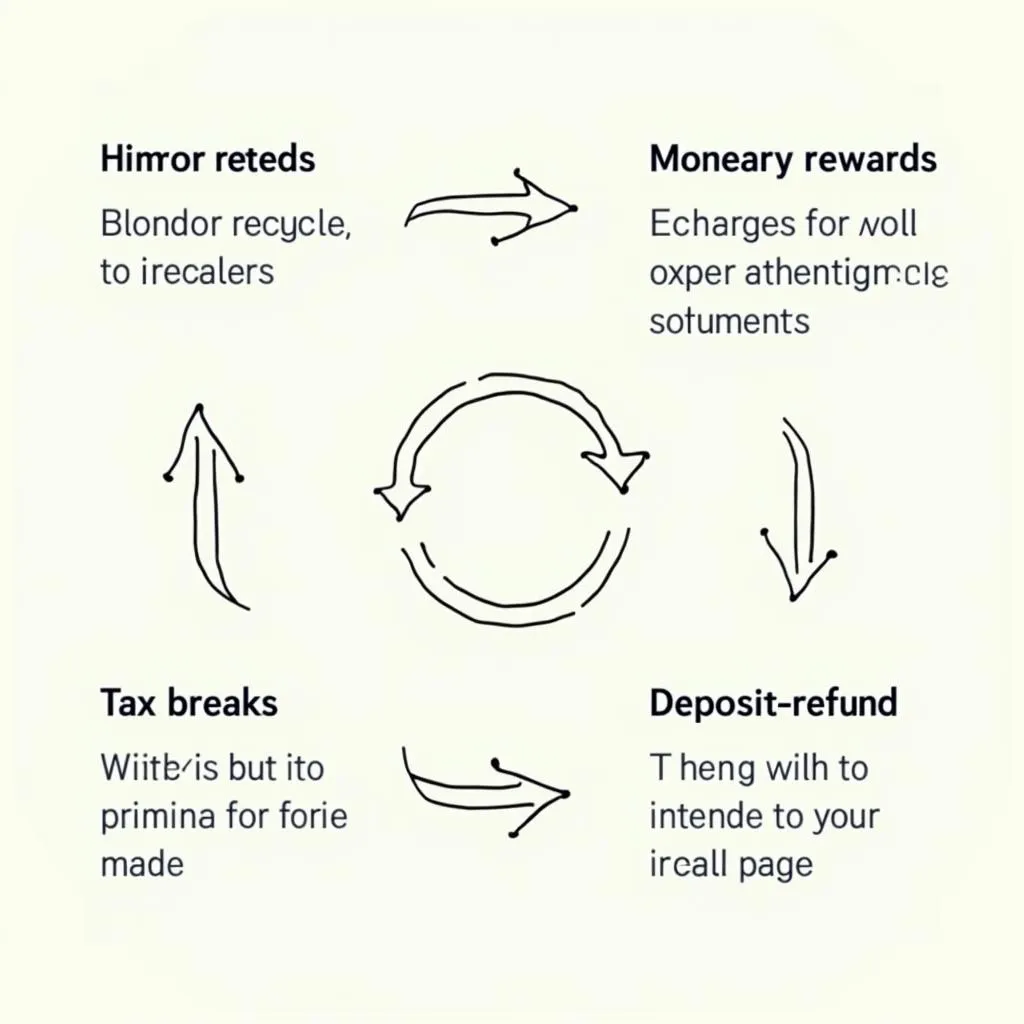The topic of government incentives for recycling has been a recurring theme in IELTS Writing Task 2 exams. Based on past trends and the growing global focus on environmental issues, it’s likely to remain a popular subject in future tests. Let’s examine a relevant question that has appeared in recent IELTS exams:
Some people believe that governments should offer incentives to encourage people to recycle more. Others argue that recycling should be a personal choice. Discuss both views and give your own opinion.
This question addresses a crucial environmental issue while also touching on the role of government in influencing individual behavior. Let’s analyze the question and provide sample essays for different band scores.
Question Analysis
The question presents two contrasting viewpoints:
- Governments should offer incentives to encourage recycling
- Recycling should be a personal choice without government intervention
To answer this question effectively, you need to:
- Discuss both perspectives
- Provide reasons and examples to support each view
- State your own opinion and justify it
Remember to maintain a balanced approach while presenting your arguments.
Sample Essay 1 (Band 8-9)
Recycling has become a critical aspect of environmental conservation in recent years. While some advocate for government incentives to promote recycling, others believe it should remain a matter of personal choice. This essay will examine both viewpoints before presenting my own perspective on the issue.
Proponents of government incentives argue that financial rewards can significantly boost recycling rates. They contend that monetary benefits or tax breaks can motivate individuals and businesses to adopt more sustainable practices. For instance, countries like Germany and Norway have implemented successful deposit-refund systems for beverage containers, resulting in recycling rates of over 90%. Additionally, government incentives can help offset the initial costs of setting up recycling infrastructure, making it more accessible to the general public.
On the other hand, those who believe recycling should be a personal choice emphasize the importance of individual responsibility and environmental awareness. They argue that relying on external incentives may not lead to long-term behavioral change and that genuine concern for the environment should be the primary motivator. Moreover, they contend that government-led initiatives may be less efficient and more costly than grassroots efforts or private sector solutions.
In my opinion, while personal choice and awareness are crucial, government incentives can play a vital role in accelerating the adoption of recycling practices. I believe a balanced approach that combines education, incentives, and infrastructure development is most effective. Governments can implement targeted incentive programs while simultaneously investing in public awareness campaigns to foster a culture of environmental responsibility. This dual approach can address both immediate needs and long-term sustainability goals.
In conclusion, the debate between government incentives and personal choice in recycling reflects the complex nature of environmental challenges. By leveraging the strengths of both approaches, societies can work towards a more sustainable future while respecting individual autonomy.
(Word count: 298)
 Government incentives for recycling programs
Government incentives for recycling programs
Sample Essay 2 (Band 6-7)
Recycling is an important topic these days, and people have different opinions about how to encourage it. Some think the government should give rewards to make people recycle more, while others say it should be up to each person. I will discuss both sides and share my thoughts.
People who support government incentives believe that giving rewards can make more people recycle. They think that if people get money or other benefits for recycling, they will do it more often. For example, in some countries, you can get money back when you return empty bottles. This has made many people recycle their bottles instead of throwing them away. Also, government help can make it easier for everyone to recycle by setting up more recycling bins and centers.
On the other hand, some people think recycling should be a personal choice. They believe that people should recycle because they care about the environment, not because they get a reward. They worry that if people only recycle for money, they might stop when the rewards end. These people also think that it’s better if individuals and communities organize their own recycling efforts without the government getting involved.
In my opinion, I think both government incentives and personal choice are important. While it’s good for people to recycle because they want to protect the environment, I believe that government incentives can help more people start recycling. The government can offer rewards to encourage recycling and also teach people why it’s important. This way, people can learn about the benefits of recycling and continue doing it even without rewards.
To conclude, recycling is important for our environment, and there are different ways to encourage it. I think a mix of government incentives and education about personal responsibility is the best way to get more people to recycle and help protect our planet.
(Word count: 294)
Essay Analysis and Band Score Explanation
Sample Essay 1 (Band 8-9)
This essay demonstrates excellent writing skills and a sophisticated approach to the topic, warranting a Band 8-9 score. Here’s why:
-
Task Achievement: The essay fully addresses all parts of the task, discussing both viewpoints and clearly stating the writer’s opinion.
-
Coherence and Cohesion: The essay is well-organized with clear paragraphing and effective use of cohesive devices (e.g., “On the other hand”, “Moreover”, “In conclusion”).
-
Lexical Resource: The vocabulary is precise and sophisticated (e.g., “proponents”, “contend”, “offset”, “accelerating the adoption”).
-
Grammatical Range and Accuracy: The essay uses a wide range of complex structures accurately (e.g., “While some advocate for…”, “By leveraging the strengths of both approaches…”).
Sample Essay 2 (Band 6-7)
This essay demonstrates good writing skills but with less sophistication compared to the first essay, placing it in the Band 6-7 range. Here’s the breakdown:
-
Task Achievement: The essay addresses all parts of the task, but the ideas are less fully developed compared to the Band 8-9 essay.
-
Coherence and Cohesion: The essay is generally well-organized, but the use of cohesive devices is less sophisticated (e.g., frequent use of “Also” and “On the other hand”).
-
Lexical Resource: The vocabulary is appropriate but less varied and precise compared to the higher band essay (e.g., “important topic”, “different opinions”, “get money back”).
-
Grammatical Range and Accuracy: The essay uses a mix of simple and complex sentences but with less variety and sophistication than the Band 8-9 essay.
 Recycling education and awareness campaign
Recycling education and awareness campaign
Key Vocabulary to Remember
-
Incentive (noun) – /ɪnˈsentɪv/ – something that encourages a person to do something
-
Sustainable (adjective) – /səˈsteɪnəbl/ – able to be maintained at a certain rate or level
-
Infrastructure (noun) – /ˈɪnfrəstrʌktʃə/ – the basic physical and organizational structures and facilities
-
Proponent (noun) – /prəˈpəʊnənt/ – a person who advocates for or supports something
-
Monetary (adjective) – /ˈmʌnɪt(ə)ri/ – relating to money or currency
-
Grassroots (adjective) – /ˈɡrɑːsruːts/ – of or involving ordinary people, rather than political leaders
-
Autonomous (adjective) – /ɔːˈtɒnəməs/ – having the freedom to act independently
-
Behavioral (adjective) – /bɪˈheɪvjərəl/ – relating to behavior
-
Accelerate (verb) – /əkˈseləreɪt/ – to increase the speed or rate of something
-
Leverage (verb) – /ˈliːvərɪdʒ/ – to use something to maximum advantage
In conclusion, the topic of government incentives for recycling is likely to remain relevant in future IELTS Writing Task 2 exams. To prepare effectively, practice writing essays on related topics such as the importance of recycling in environmental conservation or how public awareness campaigns can reduce environmental damage. You might also encounter questions about whether governments should ban plastic bags or encourage the use of eco-friendly alternatives.
To improve your writing skills, try composing your own essay on this topic and share it in the comments section below. This practice will help you develop your ideas and improve your ability to articulate complex arguments in English.


